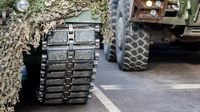In recent months, German defense stocks have experienced significant surges fueled by an uptick in military budgets across Europe. This development has led market analysts to predict continued growth in defense investments, particularly in light of heightened geopolitical tensions.
Notably, Rheinmetall, one of Germany's leading defense contractors, has been at the forefront of this bullish trend. The company's stock has skyrocketed by an impressive 114.69 percent in the past few months, trading at approximately €1,319.50 as of March 25, 2025. According to analysts at Hauck Aufhäuser Investment Banking, Rheinmetall's price target has nearly doubled, increasing from €920 to €1,800. Similarly, Jefferies analyst Cloe Lemarie cites the company as her favorite in the sector, projecting a price target of €1,540.
UBS analyst Sven Weier is equally optimistic, having revised his target for Rheinmetall to €1,600, noting that the firm anticipates capturing 20 to 25 percent of the defense expenditure from European NATO states in the subsequent five years. “The market is not wasting time reassessing,” stated Stephen Innes, Managing Partner at SPI Asset Management, echoing a sentiment shared by many experts observing the market shifts.
However, Rheinmetall isn't the only company reaping the benefits of this military spending boom. HENSOLDT and Renk, too, are witnessing dramatic stock price increases. HENSOLDT’s shares soared by 97.68 percent, reaching €68.20. Deutsche Bank Research has maintained a 'Buy' recommendation with a target set at €62, emphasizing the accelerated shift in Europe’s defense policy. Conversely, Jefferies recently introduced HENSOLDT in their analysis as 'Underperform', citing concerns over market volatility.
Similarly, Renk’s stock has surged by 137.97 percent, now trading at €43.08. Bank of America has also joined the optimistic chorus, boosting its price target for Renk from €42 to €49.50. As the geopolitical landscape shifts, analysts predict substantial opportunities for these defense companies, particularly with European nations under pressure to ramp up their military capabilities.
Investment in military technologies is not limited to traditional defense firms. Companies like SFC Energy and Deutz are diversifying into military applications, resulting in substantial growth. Specifically, SFC Energy has increased its stock value by nearly 38 percent, expanding significantly within the U.S. market and exploring opportunities in the defense sector, despite the military segment currently accounting for less than ten percent of its total revenues.
Meanwhile, Deutz’s stock has dramatically climbed by about 81 percent and is currently valued at just over €7. The firm is looking to penetrate the military vehicle market with plans for expanding its business opportunities in multiple nations, as stated by CEO Sebastian Schulte. With rising target prices, analysts from Warburg Research predict that Deutz could reach over €11, offering potential growth for savvy investors.
The backdrop of these market maneuvers is Germany's larger push towards military readiness, a drastic pivot from previous austerity measures. One market expert commented, “Germany will release hundreds of billions of Euros for investments in defense and infrastructure, marking a significant turnaround from strict debt controls.” This shift underscores the urgency to bolster defense capabilities amid evolving global threats, an evolution echoed throughout Europe's NATO community.
As military modernization continues, analysts assert that defense companies are not only well-positioned for immediate gains but might also benefit from a multi-year rearmament cycle. As geopolitical tensions rise, the catalysts for sustained growth in the defense sector appear robust, with investors watching closely for new opportunities.
While some companies enjoy surging stock prices, others face scrutiny over performance and projections. For potential investors, the defense sector holds promise. The shifting balance in military policy, coupled with an increasing willingness of NATO countries to invest in defense, is setting the stage for prolonged demand for armaments and military technology. As the market evolves, analysts are re-evaluating their strategies, positioning their clients to benefit from the anticipated future surges in defense spending.
This period of growth reflects just the beginning of what many expect to be a significant restructuring in Europe’s defense capabilities. Stakeholders within the industry and investors alike are preparing for a landscape dramatically altered by decisions made today in the halls of government and corporate boardrooms.





